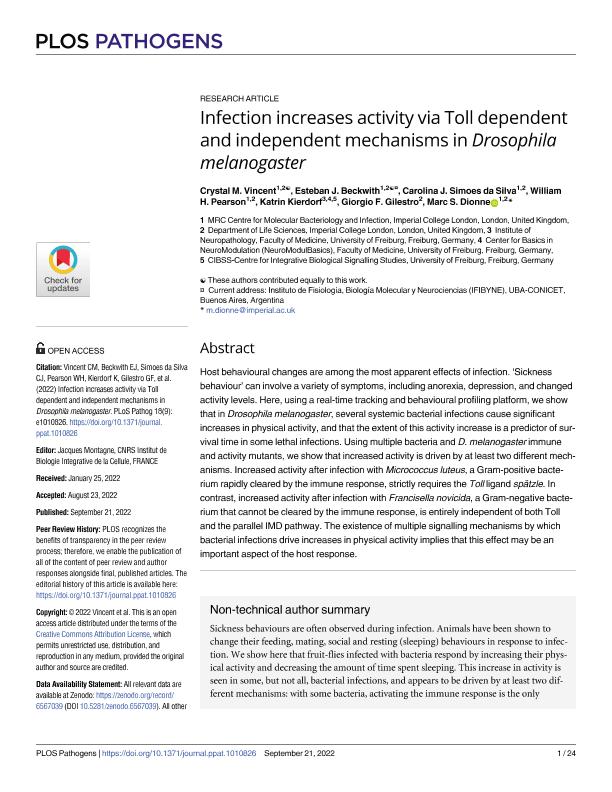Mostrar el registro sencillo del ítem
dc.contributor.author
Vincent, Crystal M.
dc.contributor.author
Beckwith, Esteban Javier

dc.contributor.author
Simoes da Silva, Carolina J.
dc.contributor.author
Pearson, William H.
dc.contributor.author
Kierdorf, Katrin
dc.contributor.author
Gilestro, Giorgio F.
dc.contributor.author
Dionne, Marc S.
dc.date.available
2023-08-23T13:06:37Z
dc.date.issued
2022-09
dc.identifier.citation
Vincent, Crystal M.; Beckwith, Esteban Javier; Simoes da Silva, Carolina J.; Pearson, William H.; Kierdorf, Katrin; et al.; Infection increases activity via Toll dependent and independent mechanisms in Drosophila melanogaster; Public Library of Science; Plos Pathogens; 18; 9; 9-2022; 1-24
dc.identifier.issn
1553-7366
dc.identifier.uri
http://hdl.handle.net/11336/209029
dc.description.abstract
Host behavioural changes are among the most apparent effects of infection. ‘Sickness behaviour’ can involve a variety of symptoms, including anorexia, depression, and changed activity levels. Here, using a real-time tracking and behavioural profiling platform, we show that in Drosophila melanogaster, several systemic bacterial infections cause significant increases in physical activity, and that the extent of this activity increase is a predictor of survival time in some lethal infections. Using multiple bacteria and D. melanogaster immune and activity mutants, we show that increased activity is driven by at least two different mechanisms. Increased activity after infection with Micrococcus luteus, a Gram-positive bacterium rapidly cleared by the immune response, strictly requires the Toll ligand spätzle. In contrast, increased activity after infection with Francisella novicida, a Gram-negative bacterium that cannot be cleared by the immune response, is entirely independent of both Toll and the parallel IMD pathway. The existence of multiple signalling mechanisms by which bacterial infections drive increases in physical activity implies that this effect may be an important aspect of the host response.
dc.format
application/pdf
dc.language.iso
eng
dc.publisher
Public Library of Science

dc.rights
info:eu-repo/semantics/openAccess
dc.rights.uri
https://creativecommons.org/licenses/by-nc-sa/2.5/ar/
dc.subject
immunity
dc.subject
behaviour
dc.subject
drosophila
dc.subject.classification
Biología Celular, Microbiología

dc.subject.classification
Ciencias Biológicas

dc.subject.classification
CIENCIAS NATURALES Y EXACTAS

dc.title
Infection increases activity via Toll dependent and independent mechanisms in Drosophila melanogaster
dc.type
info:eu-repo/semantics/article
dc.type
info:ar-repo/semantics/artículo
dc.type
info:eu-repo/semantics/publishedVersion
dc.date.updated
2023-06-30T10:49:05Z
dc.journal.volume
18
dc.journal.number
9
dc.journal.pagination
1-24
dc.journal.pais
Estados Unidos

dc.description.fil
Fil: Vincent, Crystal M.. Imperial College London; Reino Unido
dc.description.fil
Fil: Beckwith, Esteban Javier. Imperial College London; Reino Unido. Consejo Nacional de Investigaciones Científicas y Técnicas. Oficina de Coordinación Administrativa Ciudad Universitaria. Instituto de Fisiología, Biología Molecular y Neurociencias. Universidad de Buenos Aires. Facultad de Ciencias Exactas y Naturales. Instituto de Fisiología, Biología Molecular y Neurociencias; Argentina
dc.description.fil
Fil: Simoes da Silva, Carolina J.. Imperial College London; Reino Unido
dc.description.fil
Fil: Pearson, William H.. Imperial College London; Reino Unido
dc.description.fil
Fil: Kierdorf, Katrin. Albert Ludwigs University of Freiburg; Alemania
dc.description.fil
Fil: Gilestro, Giorgio F.. Imperial College London; Reino Unido
dc.description.fil
Fil: Dionne, Marc S.. Imperial College London; Reino Unido
dc.journal.title
Plos Pathogens

dc.relation.alternativeid
info:eu-repo/semantics/altIdentifier/doi/http://dx.doi.org/10.1371/journal.ppat.1010826
Archivos asociados
